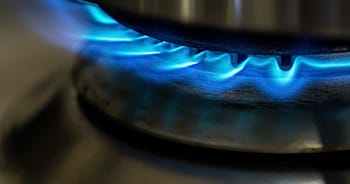What is the average energy consumption for different UK businesses?
Although most businesses use between 15,000 and 25,000 kWh of energy a year, the average usage and cost of energy will differ depending on the size of the business, industry and how it uses energy.
Energy prices have been unusually volatile over the last few years, which has caused huge differences in the rates suppliers quoted. Prices began to drop steadily from December 2022 and levelled off across 2023. Prices remained relatively steady across 2024 but are still markedly higher than before the pandemic.
Although rates are no longer as volatile (and are now closer to what they were towards the end of 2021) And they do seem to be rising again, though more steadily than in previous years. For a closer look at why energy prices are changing, check out our guide - what's going on with energy prices?
Let's look at how much energy businesses of different sizes generally use, the rates they might pay, and some ways to cut costs.

Five-point summary
- Average energy consumption changes by business size. The smallest businesses generally use around 10,000 kWh of gas and 15,000 kWh of electricity a year, while the largest businesses use more than 65,000 kWh of gas and 50,000 kWh of electricity per year.
- A range of factors affect your energy usage, including business type and size, operating hours, employee habits, equipment efficiency, and energy-saving measures. Location and climate can also affect heating and cooling needs.
- High-consumption industries include pharmaceutical manufacturing (36,665 kWh total), libraries/museums (28,431 kWh total), and basic metals manufacturing (24,433 kWh total). Lower consumption industries include wood manufacturing (~6,180 kWh total) and cleaning services (~1,595 kWh total).
- Business energy bills include unit costs (kWh price) and standing charges (daily supply cost). Fixed-rate tariffs offer price stability, while variable rates fluctuate with market trends.
- If you're looking to cut your energy usage, try the following:
- Conduct an energy audit to identify inefficiencies.
- Switch to energy-efficient lighting, appliances, and smart meters.
- Encourage staff to adopt energy-saving habits.
- Consider renewable energy sources and switching energy suppliers for better rates.
How much energy does an average business use?
All businesses have different energy demands - even if two businesses seem identical, if they operate from different premises, they could have different heating, lighting and energy efficiency systems. All these things can affect the amount of energy they use.
Even having different opening times and employees with different energy usage habits can impact energy usage.
Ofgem's 2022 non-domestic business energy report found that around two-thirds of micro business owners don’t know how much gas (70%) or electricity (64%) they use each year. If this sounds like you, here are some average figures to give you an idea of roughly how much you can expect to use:
- Microbusinesses use an average of 10,000 kWh of gas and up to 15,000 kWh of electricity a year
- Small businesses use an average of 25,000 kWh of gas and up to 25,000 kWh of electricity a year
- Medium-sized businesses use an average of 45,000 kWh of gas and up to 50,000 kWh of electricity a year
- Large businesses use more than 65,000 kWh of gas and more than 50,000kWh of electricity a year
But the 2023 non-domestic energy report suggests that businesses have become much more savvy about their energy usage. Perhaps out of necessity following the 2022 price crisis. The Ofgem report found that 89% of businesses now monitor energy usage, usually through bills (75%) and meters (51%). Larger businesses are more likely to use smart meters.
What factors influence a business's energy usage?
Several key things influence how much energy a business uses.
First, the size and type of the business matter - a manufacturing plant will use far more energy than a small office. Equipment and technology also play a role as older, inefficient machines use more power.
Operating hours can also make a difference, as businesses running 24/7 will naturally use more energy. If this sounds like your business, you might be able to cut your bills with a time-of-use tariff.
Location and climate can impact heating and cooling needs, as can employee habits. A simple way to cut usage is to make sure employees get into the habit of switching off lights and equipment in rooms that are not in use. Making use of a thermostat timer can also help with heating and cooling costs.
How does energy usage differ across industries?
Energy usage varies widely across industries based on how each business uses gas and electricity.
Manufacturing and heavy industries, like steel or chemical production, consume massive amounts of energy to power machinery, heat materials, and run continuous processes. In contrast, offices and retail stores use much less, mainly for lighting, heating, cooling, and electronics.
The transportation industry relies heavily on fuel for vehicles, while agriculture uses energy for irrigation, machinery, and refrigeration. Tech companies and data centers have high electricity demands to keep servers running 24/7. AI uses an incredible amount of energy - in 2022, AI data centers used about 460 terawatt-hours (TWh) of electricity. This is roughly 1 to 2% of the world's electricity demand.
Each industry has unique needs, but energy efficiency measures can help reduce costs and environmental impact for all businesses.
What makes up an average commercial energy bill?
Energy usage is measured in units of kilowatt-hours (kWh). Your energy bills will vary depending on how much gas and electricity you use at your business premises.
The cost of your bills will also be affected by the type of tariff you're on, and although your business energy bill is made up of several costs, including VAT and government levies, there are two figures you need to look out for:
- Unit cost - Measured in kilowatt-hours (kWh), this is the amount you pay for each unit of gas or electricity you use.
- Standing charge - This is a flat daily rate to cover the cost of getting the energy to your property and is charged regardless of whether you use gas or electricity.
If you’re looking to cut the cost of your bills, you’ll want a tariff that offers a lower unit rate and lower standing charge than the one you’re currently on, but you might be able to lower your bills by cutting the cost of just one of these charges.
The type of deal you’re on will also affect the cost of your business energy bills, and while there is a range of commercial tariffs on offer, simply choosing between a fixed rate and variable rate tariff can make a significant difference.
If you're on a variable-rate energy deal, the unit cost will fluctuate depending upon the current market cost of energy - if prices go up, so do your energy bills, even if you consistently use the same amount of gas and electricity each month.
If you sign up for a fixed-rate deal, the unit rate is fixed and you’ll pay a flat rate for each unit of energy you use. Fixed-rate deals offer an effective way to protect against price hikes if energy rates increase, and can also make budgeting a bit easier, but your bills will still fluctuate according to your usage.
What is the average energy consumption for different businesses?
Ever wondered what the average electricity or gas bill would be for different businesses? Or are you starting a new business and want to find out what you can expect to pay. Here’s a breakdown of different industries and the amount of energy used in 2023.
| Industry | Electricity (kWh) | Gas (kWh) | Total (kWh) |
| Pharmaceutical Manufacturing | 24,049 | 49,281 | 36,665 |
| Libraries, Archives & Museums | 12,454 | 156,249 | 28,431 |
| Basic Metal Manufacturing | 16,255 | 40,791 | 24,433 |
| Food Manufacturing | 25,682 | 16,247 | 23,166 |
| Food & Beverage Services | 17,330 | 35,471 | 22,865 |
| Waste Collection, Treatment & Disposal | 17,797 | 66,104 | 22,189 |
| Care Home Services | 16,223 | 30,510 | 20,470 |
| Hotels & B&Bs | 12,873 | 34,003 | 18,328 |
| Beverage Manufacturing | 16,199 | 16,199 | |
| Computer Repair Shops | 11,506 | 22,225 | 14,568 |
| Chemical Manufacturing | 9,932 | 34,587 | 14,283 |
| Other manufacturing | 12,368 | 20,378 | 14,227 |
| Metal manufacturing | 13,743 | 14,054 | 13,818 |
| Sports & Recreation Facilities | 11,370 | 20,477 | 13,444 |
| Legal & Accounting Services | 8,535 | 25,474 | 13,299 |
| Equipment Installation & Machinery Repair | 9,773 | 23,875 | 13,299 |
| Forestry & Logging | 11,154 | 16,690 | 12,999 |
| Electrical Equipment Manufacturing | 10,473 | 22,077 | 12,890 |
| Machinery Manufacturing n.e.c. | 13,408 | 9,122 | 12,749 |
| Retail Trading (excluding cars and motorcycles) | 11,001 | 18,798 | 12,459 |
| Office Administration & Office Support | 10,552 | 18,864 | 12,411 |
| Real Estate Services | 10,198 | 18,850 | 12,024 |
| Financial Services (excluding insurance & pensions) | 9,661 | 21,165 | 11,952 |
| Architectural & Engineering Services | 10,118 | 15,300 | 11,464 |
| Education | 8,841 | 19,316 | 11,346 |
| Computer Programming Consultancy | 11,726 | 9,157 | 11,331 |
| Travel Agencies & Tour Operators | 8,447 | 19,850 | 10,847 |
| Warehouse and transport | 8,829 | 20,631 | 10,675 |
| Landscaping and building servicing | 8,628 | 17,537 | 10,499 |
| Wholesale Trade (excluding cars and motorcycles) | 9,531 | 14,028 | 10,398 |
| Plastic and rubber manufacturing | 4,810 | 21,423 | 10,348 |
| Car, Trailer & Semi-trailer Production | 12,383 | N/A | 10,319 |
| Furniture Manufacturing | 10,124 | 10,548 | 10,218 |
| Car, Motorcycle Trade & Repair | 9,653 | 12,974 | 10,210 |
| Creative, arts, and entertainment | 6,025 | 23,140 | 10,132 |
| Specicalised Construction Services | 8,672 | 14,265 | 9,894 |
| Water Transport | 9,115 | N/A | 9,115 |
| Printing Shops | 9,285 | 5,302 | 8,547 |
| Rental and Leasing | 5,869 | 17,403 | 7,866 |
| Professional consultancy services | 7,287 | 8,269 | 7,508 |
| Vets | 7,953 | 6,155 | 7,414 |
| Wood Manufacturing | 6,656 | N/A | 6,180 |
| Waste management | 4,788 | 7,658 | 5,744 |
| Clothes/Apparel Manufacturing | 2,553 | 11,651 | 4,286 |
| Cleaning and housekeeping | 1,595 | N/A | 1,595 |
*These figures are based on usage of customers who bought energy contracts through Bionic in 2023.
What businesses use the most energy?
The type of industry you work in and the way your business uses energy will determine the amount of energy it uses each year. Here is a breakdown of the biggest energy consumers by industry.
Top industries with the highest average energy consumption
| Industry | Electricity (kWh) | Gas (kWh) | Total |
| Manufacturing of Basic Pharmaceutica Products & Preparations | 24,049 | 49,281 | 36,665 |
| Libraries, Archives & Musuems | 12,454 | 156,249 | 28,431 |
| Insurance, Reinsurance & Pension Funding (except compulsory social security) | 24,785 | - | 24,785 |
| Basic Metals Manufacturing | 16,255 | 40,791 | 24,433 |
| Food Manufacturing | 25,682 | 16,247 | 23,166 |
| Food & Beverage Services | 17,330 | 35,471 | 22,865 |
| Waste Collection, Treatment Disposal Services | 17,797 | 66,104 | 22,189 |
| Care Home Services | 16,223 | 30,510 | 20,470 |
| Textile Manufacturing | 15,048 | 39,206 | 20,416 |
| Public Administration & Defense (compulsory social security) | 15,518 | 29,171 | 18,768 |
*These figures are based on usage of customers who bought energy contracts through Bionic in 2023.
How to cut your business energy usage
Managing and improving the energy efficiency of your business will help to reduce the amount of energy consumed. There are any number of ways to do this, such as:
- Carrying out an energy audit
- Using energy-efficient lighting
- Using energy-efficient computers
- Encouraging your staff to go green
- Generating your own renewable energy
Although the effectiveness of any energy efficiency measures depends on the type of business you run and the steps you take, even making a few small changes can help to make a big difference.
How to reduce your business energy bills
Cutting the amount of gas and electricity you use is the most effective way to cut your business energy bills (and do your bit for the environment). But switching energy suppliers is a quick and simple way to cut costs.
The tech-enabled energy experts at Bionic can find the right deal for your business in a matter of minutes and help you with the switch. To start your business energy comparison, let us know your postcode or give us a call on 0800 077 3701 and we’ll do the rest.
If you don’t arrange a new deal before your current one expires, your supplier will place you on its more expensive rates. The only way to make sure that you never pay more than you need to for energy is to stay on top of your renewal dates and switch at the right time.
If this sounds like too much hassle, don’t worry - our Digital Renewal service can automatically take care of renewals so you never overpay for energy again.
We can also help you with a range of other business essentials, including business insurance, VoIP, phone and broadband.








